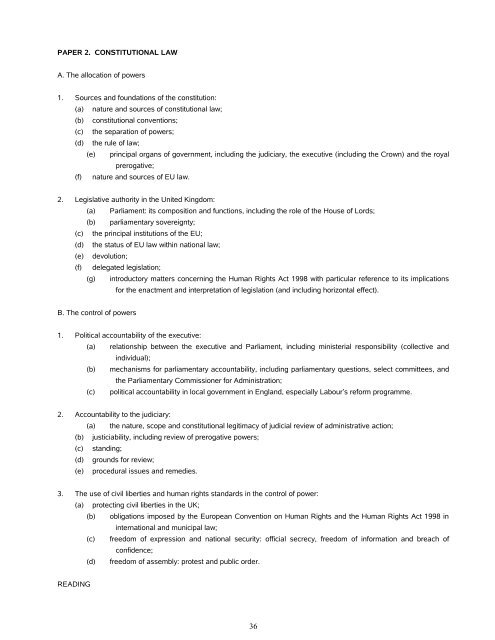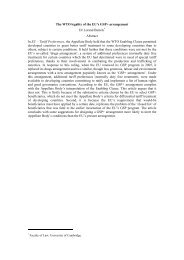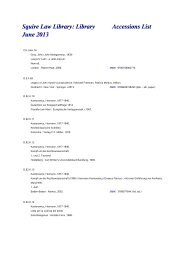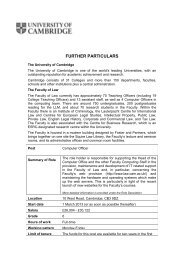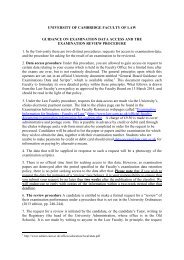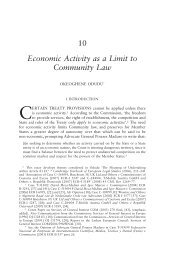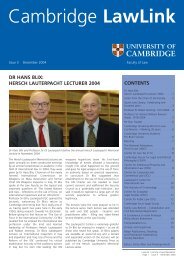PAPER 2. CONSTITUTIONAL LAWA. The allocation <strong>of</strong> powers1. Sources and foundations <strong>of</strong> the constitution:(a) nature and sources <strong>of</strong> constitutional law;(b) constitutional conventions;(c) the separation <strong>of</strong> powers;(d) the rule <strong>of</strong> law;(e) principal organs <strong>of</strong> government, including the judiciary, the executive (including the Crown) and the royalprerogative;(f) nature and sources <strong>of</strong> EU law.2. Legislative authority in the United Kingdom:(a) Parliament: its composition and functions, including the role <strong>of</strong> the House <strong>of</strong> Lords;(b) parliamentary sovereignty;(c) the principal institutions <strong>of</strong> the EU;(d) the status <strong>of</strong> EU law within national law;(e) devolution;(f) delegated legislation;(g) introductory matters concerning the Human Rights Act 1998 with particular reference to its implicationsfor the enactment and interpretation <strong>of</strong> legislation (and including horizontal effect).B. The control <strong>of</strong> powers1. Political accountability <strong>of</strong> the executive:(a) relationship between the executive and Parliament, including ministerial responsibility (collective andindividual);(b) mechanisms for parliamentary accountability, including parliamentary questions, select committees, andthe Parliamentary Commissioner for Administration;(c) political accountability in local government in England, especially Labour’s reform programme.2. Accountability to the judiciary:(a) the nature, scope and constitutional legitimacy <strong>of</strong> judicial review <strong>of</strong> administrative action;(b) justiciability, including review <strong>of</strong> prerogative powers;(c) standing;(d) grounds for review;(e) procedural issues and remedies.3. The use <strong>of</strong> civil liberties and human rights standards in the control <strong>of</strong> power:(a) protecting civil liberties in the UK;(b) obligations imposed by the European Convention on Human Rights and the Human Rights Act 1998 ininternational and municipal law;(c) freedom <strong>of</strong> expression and national security: <strong>of</strong>ficial secrecy, freedom <strong>of</strong> information and breach <strong>of</strong>confidence;(d) freedom <strong>of</strong> assembly: protest and public order.READING36
Introductory:Tomkins, Public <strong>Law</strong> (2003)Leyland, The Constitution <strong>of</strong> the United Kingdom: A Contextual Analysis (2007)Brazier (ed), Parliament, Politics and <strong>Law</strong> Making: Issues and Developments in the Legislative Process (2004)Textbooks, cases and materials:Barnett, Constitutional and Administrative <strong>Law</strong> (7th ed 2010)Bradley and Ewing, Constitutional and Administrative <strong>Law</strong> (15th ed 2010)Loveland, Constitutional <strong>Law</strong>, Administrative <strong>Law</strong> and Human Rights: A Critical Introduction (5th ed 2009)Thompson, Cases and Materials on Constitutional and Administrative <strong>Law</strong> (9th ed 2009)Turpin and Tomkins, British Government and the Constitution: Text, Cases and Materials (6th ed 2007)Further reading and reference:Allan, <strong>Law</strong>, Liberty, and Justice (1993)Allan, Constitutional Justice (2001)Allison, The English Historical Constitution (2007)Baldwin, Parliament in the Twenty-first Century (2005)Bingham, The Rule <strong>of</strong> <strong>Law</strong> (2010)Bogdanor (ed), The British Constitution in the Twentieth Century (2003)Bogdanor, The New British Constitution (2009)Brazier, Constitutional Practice (3rd ed 1999)Craig, Administrative <strong>Law</strong> (6th ed 2008)Dicey, Introduction to the Study <strong>of</strong> the <strong>Law</strong> <strong>of</strong> the Constitution (10th ed, Wade, 1959)Elliott, The Constitutional Foundations <strong>of</strong> Judicial Review (2001)Elliott, Beatson and Matthews Cases and Materials on Administrative <strong>Law</strong> (3rd ed 2005)Feldman, Civil Liberties and Human Rights in England and Wales (2nd ed 2002)Feldman (ed), English Public <strong>Law</strong> (2nd ed 2009)Fenwick, Civil Liberties and Human Rights (4th ed 2007)Fenwick and Phillipson, Text, Cases and Materials on Public <strong>Law</strong> and Human Rights (3rd ed 2010)Forsyth and Hare (eds), The Golden Metwand and the Crooked Cord: Essays in Honour <strong>of</strong> Sir William Wade (1998)Gearty, Principles <strong>of</strong> Human Rights Adjudication (2004)Gearty, Can Human Rights Survive? (2006)Hailsham, On the Constitution (1982)Heuston, Essays in Constitutional <strong>Law</strong> (2nd ed 1964)Irvine, Human Rights, Constitutional <strong>Law</strong> and the Development <strong>of</strong> the English Legal System (2003)Jennings, The <strong>Law</strong> and the Constitution (5th ed 1959)Johnson, Reshaping the British Constitution (2004)Jowell and Oliver (eds), The Changing Constitution (6th ed 2007)Leigh, <strong>Law</strong>, Politics and Local Democracy (2000)Loughlin, The Idea <strong>of</strong> Public <strong>Law</strong> (2004)Loughlin, Foundations <strong>of</strong> Public <strong>Law</strong> (2010)Marshall, Constitutional Conventions (1986)Marshall, Constitutional Theory (1971)Mowbray, Cases and Materials on the European Convention on Human Rights (2nd ed 2007)37
- Page 2 and 3: ContentsGeneral InformationOfficers
- Page 4 and 5: Settlement of International Dispute
- Page 6 and 7: Faculty AdministrationFaculty Offic
- Page 8 and 9: The Faculty of LawLaw has been stud
- Page 10 and 11: The LLM Degree. This degree is awar
- Page 12 and 13: Opening Hours:Full Term: Monday to
- Page 14 and 15: Rules Made by the Information Strat
- Page 16 and 17: The Lauterpacht Centre for Internat
- Page 18 and 19: Centre for Corporate and Commercial
- Page 20 and 21: Cambridge Socio-Legal GroupThe Camb
- Page 26 and 27: Dates of Faculty Board Meetings7 Oc
- Page 28 and 29: Proceed with caution in reaching fo
- Page 30 and 31: Faculty CommunicationEach year, the
- Page 32 and 33: Law Tripos Part IA. A candidate for
- Page 34 and 35: Prizes. The following prizes may be
- Page 38 and 39: Oliver, Constitutional Reform (2003
- Page 40 and 41: Hedley, Tort (6th ed 2008)Weir, An
- Page 42 and 43: 3. Trusts and co-ownership: Concurr
- Page 44 and 45: Brownlie, Principles of Internation
- Page 46 and 47: Elliott, Constitutional Foundations
- Page 48 and 49: Contract: covenant and debt; assump
- Page 50 and 51: Statutes:Blackstone’s Statutes on
- Page 52 and 53: For reference:Birks and Pretto (ed)
- Page 54 and 55: Foster, EU Legislation (2010-2011)B
- Page 56 and 57: PAPER 42. INTELLECTUAL PROPERTY1. I
- Page 58 and 59: 2. Property torts (conversion and t
- Page 60 and 61: (iii)Causation4. Contracts in Engla
- Page 62 and 63: Rawls, Political LiberalismRawls, J
- Page 64 and 65: Rodger and McCulloch, The UK Compet
- Page 66 and 67: Law Commission, Renting Homes: The
- Page 68 and 69: Human Rights Case DigestHuman Right
- Page 70 and 71: 3. Title at common law and in equit
- Page 72 and 73: Exemption from Professional Examina
- Page 74 and 75: Paper application available to down
- Page 76 and 77: Form of Examination and Designation
- Page 78 and 79: ‘Open Book’ Papers. Where a pap
- Page 80 and 81: LLM : Syllabuses and Lists of Recom
- Page 82 and 83: ased upon one or two leading cases,
- Page 84 and 85: Goff and Jones, The Law of Restitut
- Page 86 and 87:
Butterworths’ Company Law Handboo
- Page 88 and 89:
2. The EU’s system for human righ
- Page 90 and 91:
the context of environmental protec
- Page 92 and 93:
European Competition Law Review (EC
- Page 94 and 95:
Crawford, The Treatment of Combatan
- Page 96 and 97:
Douglas, The International Law of I
- Page 98 and 99:
Unger, Free Trade Reimagined (2007)
- Page 100 and 101:
3. Sceptics and Critics I4. Sceptic
- Page 102 and 103:
The course provides an opportunity
- Page 104 and 105:
(iv)(v)(vi)(vii)Is either utilitari
- Page 106 and 107:
Reiman, ‘Justice, Civilization, a
- Page 108 and 109:
Gardner, Introduction to the Law of
- Page 110 and 111:
1. Types of theoretical analysis an
- Page 112 and 113:
2. Specific fieldsTopics to be sele
- Page 114 and 115:
The LLM (one-year taught postgradua
- Page 116 and 117:
As part of the requirements for the
- Page 118 and 119:
Teaching Members of the Faculty of
- Page 120 and 121:
MC Elliott, MA, PhD (Cantab); St Ca
- Page 122 and 123:
RA Melikan, BA (Mich), JD, MA (Chi)
- Page 124 and 125:
BD Sloan, MA, LLM (Cantab); King’
- Page 126 and 127:
Law Teachers in the Department of L
- Page 128 and 129:
Murray Edwards College. Dr S Turenn


